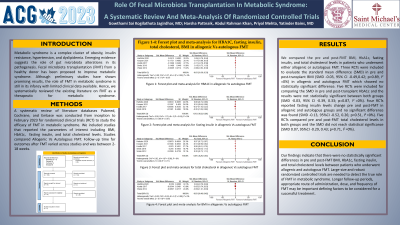Tuesday Poster Session
Category: Liver
P3857 - Role of Fecal Microbiota Transplantation in Metabolic Syndrome: A Systematic Review and Meta-Analysis of Randomized Controlled Trials
Tuesday, October 24, 2023
10:30 AM - 4:00 PM PT
Location: Exhibit Hall

Has Audio

Gowthami Sai Kogilathota Jagirdhar, MD
Saint Michael's Medical Center
Newark, NJ
Presenting Author(s)
Gowthami Sai Kogilathota Jagirdhar, MD1, Harsha Pattnaik, MBBS2, Abdul Rahman Khan, MBBS3, Priyal Mehta, MBBS4, Yatinder Bains, MD1
1Saint Michael's Medical Center, Newark, NJ; 2Lady Hardinge Medical College, New Delhi, Delhi, India; 3Mohammed Bin Rashid University of Medicine and Health Sciences, Dubai Healthcare City, Dubai, United Arab Emirates; 4M.W. Desai Hospital, Mumbai, Maharashtra, India
Introduction: Metabolic syndrome is a complex cluster of obesity, insulin resistance, hypertension, and dyslipidemia. Emerging evidence suggests the role of gut microbiota alterations in the pathogenesis of metabolic syndrome and fecal microbiota transplantation (FMT) from a healthy donor as a treatment strategy. Although preliminary studies have shown promising results, the role of FMT in metabolic syndrome is still in its infancy with limited clinical data available. Hence, we systematically reviewed the existing literature on FMT as a therapeutic for metabolic syndrome.
Methods: A systematic review of literature databases Pubmed, Cochrane, and Embase was conducted from inception to February 2023 for randomized clinical trials (RCT) to study the efficacy of FMT in metabolic syndrome. We included studies that reported the parameters of interest including BMI, HbA1c, fasting insulin, and total cholesterol levels. Studies compared Allogenic Vs Autologous FMT. Follow-up time for outcomes after FMT varied across studies and was between 2-18 weeks.
Results: We compared the pre and post-FMT BMI, HbA1c, fasting insulin, and total cholesterol levels in patients who underwent either allogenic or autologous FMT. Three RCTs were included to evaluate the standard mean difference (SMD) in pre and post-transplant BMI (SMD -0.03, 95% CI -0.49,0.42; p=0.89, I2 =0%) in allogenic and autologous FMT which showed no statistically significant difference. Five RCTs were included for comparing the SMD in pre and post-transplant HbA1c and the results were not statistically significant between both groups (SMD -0.03, 95% CI -0.39, 0.33; p=0.87, I2 =0%). Four RCTs reported fasting insulin levels change pre and post-FMT in allogenic and autologous groups and no significant difference was found (SMD -0.13, 95%CI -0.52, 0.26; p=0.51, I2 =0%). Five RCTs compared pre and post-FMT total cholesterol levels in both groups and the SMD did not reach statistical significance (SMD 0.07, 95%CI -0.29, 0.43; p=0.71, I2 =0%).
Discussion: Our findings indicate that there were no statistically significant differences in pre and post-FMT BMI, HbA1c, fasting insulin, and total cholesterol levels between patients who underwent allogenic and autologous FMT. Large-size and robust randomized controlled trials are needed to detect the true role of FMT in metabolic syndrome. Longer follow-up periods, appropriate route of administration, dose, and frequency of FMT may be important defining factors to be considered for a successful treatment.

Disclosures:
Gowthami Sai Kogilathota Jagirdhar, MD1, Harsha Pattnaik, MBBS2, Abdul Rahman Khan, MBBS3, Priyal Mehta, MBBS4, Yatinder Bains, MD1. P3857 - Role of Fecal Microbiota Transplantation in Metabolic Syndrome: A Systematic Review and Meta-Analysis of Randomized Controlled Trials, ACG 2023 Annual Scientific Meeting Abstracts. Vancouver, BC, Canada: American College of Gastroenterology.
1Saint Michael's Medical Center, Newark, NJ; 2Lady Hardinge Medical College, New Delhi, Delhi, India; 3Mohammed Bin Rashid University of Medicine and Health Sciences, Dubai Healthcare City, Dubai, United Arab Emirates; 4M.W. Desai Hospital, Mumbai, Maharashtra, India
Introduction: Metabolic syndrome is a complex cluster of obesity, insulin resistance, hypertension, and dyslipidemia. Emerging evidence suggests the role of gut microbiota alterations in the pathogenesis of metabolic syndrome and fecal microbiota transplantation (FMT) from a healthy donor as a treatment strategy. Although preliminary studies have shown promising results, the role of FMT in metabolic syndrome is still in its infancy with limited clinical data available. Hence, we systematically reviewed the existing literature on FMT as a therapeutic for metabolic syndrome.
Methods: A systematic review of literature databases Pubmed, Cochrane, and Embase was conducted from inception to February 2023 for randomized clinical trials (RCT) to study the efficacy of FMT in metabolic syndrome. We included studies that reported the parameters of interest including BMI, HbA1c, fasting insulin, and total cholesterol levels. Studies compared Allogenic Vs Autologous FMT. Follow-up time for outcomes after FMT varied across studies and was between 2-18 weeks.
Results: We compared the pre and post-FMT BMI, HbA1c, fasting insulin, and total cholesterol levels in patients who underwent either allogenic or autologous FMT. Three RCTs were included to evaluate the standard mean difference (SMD) in pre and post-transplant BMI (SMD -0.03, 95% CI -0.49,0.42; p=0.89, I2 =0%) in allogenic and autologous FMT which showed no statistically significant difference. Five RCTs were included for comparing the SMD in pre and post-transplant HbA1c and the results were not statistically significant between both groups (SMD -0.03, 95% CI -0.39, 0.33; p=0.87, I2 =0%). Four RCTs reported fasting insulin levels change pre and post-FMT in allogenic and autologous groups and no significant difference was found (SMD -0.13, 95%CI -0.52, 0.26; p=0.51, I2 =0%). Five RCTs compared pre and post-FMT total cholesterol levels in both groups and the SMD did not reach statistical significance (SMD 0.07, 95%CI -0.29, 0.43; p=0.71, I2 =0%).
Discussion: Our findings indicate that there were no statistically significant differences in pre and post-FMT BMI, HbA1c, fasting insulin, and total cholesterol levels between patients who underwent allogenic and autologous FMT. Large-size and robust randomized controlled trials are needed to detect the true role of FMT in metabolic syndrome. Longer follow-up periods, appropriate route of administration, dose, and frequency of FMT may be important defining factors to be considered for a successful treatment.

Figure:
Figure 1-4: Forest plot and meta-analysis for HBA1C, fasting insulin, total cholesterol, BMI in allogenic Vs autologous FMT
Figure 1-4: Forest plot and meta-analysis for HBA1C, fasting insulin, total cholesterol, BMI in allogenic Vs autologous FMT
Disclosures:
Gowthami Sai Kogilathota Jagirdhar indicated no relevant financial relationships.
Harsha Pattnaik indicated no relevant financial relationships.
Abdul Rahman Khan indicated no relevant financial relationships.
Priyal Mehta indicated no relevant financial relationships.
Yatinder Bains indicated no relevant financial relationships.
Gowthami Sai Kogilathota Jagirdhar, MD1, Harsha Pattnaik, MBBS2, Abdul Rahman Khan, MBBS3, Priyal Mehta, MBBS4, Yatinder Bains, MD1. P3857 - Role of Fecal Microbiota Transplantation in Metabolic Syndrome: A Systematic Review and Meta-Analysis of Randomized Controlled Trials, ACG 2023 Annual Scientific Meeting Abstracts. Vancouver, BC, Canada: American College of Gastroenterology.
